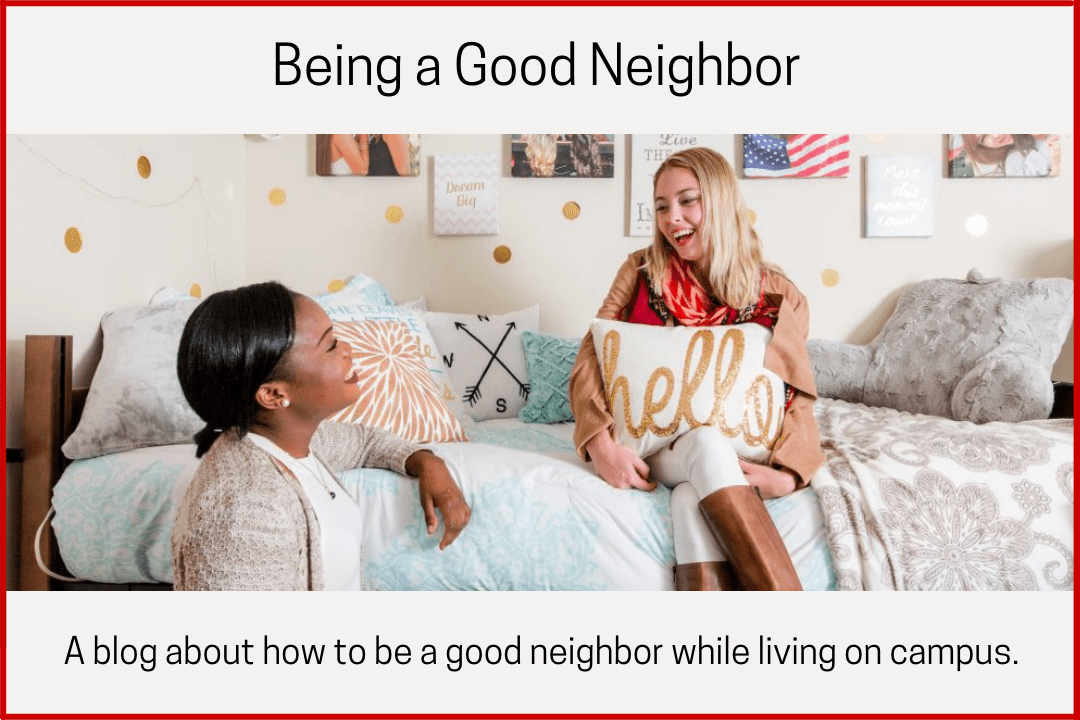
When you live on campus at the University of Utah, you’re surrounded by friends and colleagues. Since many students choose to live on campus for part of their academic path, HRE provides many residential options. With this, students are bound to have neighbors and friends who live close to them. Neighbors can provide an amazing sense of community, but students also have the responsibility and opportunity of being a good neighbor. This means keeping common spaces clean, allowing for privacy, being mindful of noise and much more. By being a good neighbor to your fellow colleagues you may gain friends, find resources and have a community to confide in. In the following, we will outline a few tips to be a good neighbor on campus.
Before you arrive to live on campus here at the U, it is helpful to practice habits of a good neighbor to make sure that you can build a good relationship with your colleagues. It is also a good idea to review HRE policies and living options to ensure that you choose the residential space that best suits your lifestyle. As I’ve lived on campus this past year, I wish folks would have known these habits before moving to a community space. I’ve experienced noise issues late at night, policy violations that created tension, messy bathrooms and more. These things made it hard to build a community with some of my neighbors, but could have been avoided by good residential habits.
One of the most important things about being a good neighbor is community awareness. This means being aware of how tidy the community space is being kept, cleanliness in shared spaces like bathrooms, hosting guests and the noise level considering what time it is. By being aware of what is going on in shared spaces, residents can help out by making the space easier to live in. It is a good habit to check-in with your resident advisor to see what improvements can be made, as well as checking-in with your neighbors to make sure everyone feels safe in their community. For most residents, campus is their new home and they should be able to feel at home in their residential community.
Along with community awareness, it is a good habit to clean up after yourself. Everybody loves a neighbor that can keep shared spaces clean and tidy, because then nobody has to worry about cleaning up after somebody else’s mess. In all of our residential areas, there is a custodial team that works to sanitize and clean our community spaces. The custodial team is not here to clean up after every single mess that is made. This is important to know when choosing how you practice daily cleanliness habits. Be sure to empty your trash into the designated garbage disposals, wipe down any surfaces that you’ve soiled, keep your personal items in your reserved room and submit a maintenance request for custodial services when needed. This will help to create a safe, clean community that will help to improve your community’s academic and lifestyle success.
Another issue that is common when sharing a community with your colleagues is noise. When you’re having fun, it’s easy to be loud and excited. It is also easy to forget how loud you actually are and how that affects others in the community space. When you begin to live on campus, we encourage you to meet with your community members and resident advisor to determine what kind of noise level you all feel comfortable with. We also recommend discussing “quiet hours” and what times community members should keep the noise level fairly low. This is important to students’ success, especially when it comes to studying for finals week. Personally, I’ve had experiences in which I had been taking an online exam in my room and got distracted from the noise in the community space. A good rule of thumb is if you think you might be too loud, take it outside. In my experience, community members had a mobile group chat so that we could text to let everybody know if we would like the community space quiet for a certain time. This helped to facilitate community engagement as well.
Overall, following HRE policies will help you to be a good neighbor and community member. Policies and community guidelines are there to keep residents safe while still being able to have fun. Resident advisors and other HRE staff are here to help you understand what each policy means and why it is important, as well as to provide resources for those who may be struggling. Living on campus can be one of the best experiences to support your academic path. By practicing good lifestyle and residential habits, you can help support your community and colleagues in their academic success. You may also gain friends and resources that will help you along the way. Visit our resident policies and responsibilities page for more information.
Recent Posts
- How to Achieve Your Goals May 17, 2024
- Activities In Salt Lake City This Summer May 10, 2024
- How to Navigate Marriott Library April 12, 2024
- Exploring Student leadership: A look into University Life March 25, 2024
- Latte Lounge February 23, 2024
